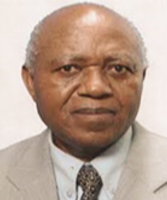
Elitabu Keto MSHIGENI
YEAR OF MATRICULATION: 1966
EDUCATION:
Elitabu Keto Mshigeni was born on January 14, 1944 in Same, in what was known then as the Northern Province of Tanzania. He went to school at Mpinji Primary School (1952-1955), Suji Middle School (1958-1959) in his home district, and Tabora Secondary School (1960-1965) – a territorially selective government school which sought to admit “best-performing” boys across the territory. So he was among the few boys who spent a whole stretch of six residential years at one school internally structured into ‘Lower School’ and ‘Upper School’, but both parts enjoying the best of the internationally sourced teachers (from UK, Canada, Australia, USA and Uganda) to complement the few local staff. A well-rounded young scholar from northern Tanganyika had an early chance of meeting and making friends with fellow boys from southern, eastern and western provinces and to develop an early academic plunge into science subjects plus the English language.
In 1966, he joined the University of East Africa at University College Dar es Salaam (UCD) for the BSc programme, which he completed in 1969. He was retained by the University as a tutorial assistant, and, in 1970 he obtained a Rockefeller Foundation scholarship for doctoral studies at the University of Hawaii in USA, getting his PhD in 1974. He is reckoned to have climbed up the academic ladder from Tutorial Assistant (1969) to full Professor (1979) in a ten-year record time. At the University of Dar es Salaam he served in different leadership capacities - as head of Botany Department (1976-1982), Professor of Botany (1979-1995), and as a founding Director of Postgraduate Studies for a continuous period of ten years from 1980 to 1990. In 1995, Professor Mshigeni got an invitation from the newly founded University of Namibia for a position of Pro-Vice-Chancellor for Academic Affairs and Research, where he served for a total of five years until 2000, when he took up a five-year appointment (2000-2005) as Director of a Regional Africa-wide Zero Emissions Research Initiative (ZERI) Project that was funded by the UNDP and aimed at bringing together creative minds to look for sustainable solutions to the principal challenges facing the global world but which were based on scientific enquiry and publicly available information for the sake of survival of society and unreached communities. From 2006, Prof. Mshigeni became ViceChancellor at Hubert Kairuki Memorial University.
Keto Elitabu Mshigeni has received many honours, including: the African Higher Education Excellence Award (AHEEA) in 2009 at the AAU’s General Conference organised in Abuja, Nigeria - the first ever then in recognition of the “distinguished contribution of an African academic to higher education in Africa through outstanding research, teaching, social responsiveness, and innovative leadership.” Professor Mshigeni is an elected Fellow of the World Technology Network (WTN) and the Third-World Academy of Sciences (TWAS). He has previously served as Secretary General of the Tanzania Academy of Sciences (TAS); Editor-in-Chief of Discovery and Innovation (a joint journal of TWAS Elitabu Keto MSHIGENI and AAS); Africa Chair of UNESCO/UNU for promoting UNU’s Zero Emissions Research Initiative (ZERI) in Africa, as well as UNU’s Chair for the International Advisory Council on ZERI. He has also served as UNOPS Regional Director for pioneering a UNDP project on Promoting Sustainable Development from Africa’s Biodiversity - a project that was based at the University of Namibia and which covered eight African countries. UNOPS is an operational arm of the United Nations dedicated to implementing projects for the United Nations system, international financial institutions, governments and other partners around the world.
As a researcher and teacher, Keto Mshigeni is a prolific writer, credited with tens of publications in journals, periodicals and conferences proceedings. His publications, which cut across the biological and environmental sciences, are many and varied, and they range from the mid-1970s well to the mid-2010s. They include Biology and Ecology of Bethic Marine Algae with Special Reference to Hypnea (Phycol. N.37, 1978); Mwani: Ukulima wake baharini na manufaa yake kwetu (1983); The Cost of Scientific and Technological Ignorance with Special Reference to Africa’s Rich Biodiversity (with Ved Mehta, 1985); Proceedings of an International Conference of Experts from Developing Countries on Traditional Medicinal Plants (editor, 1st Edition, 1991); Science, technology and research for development in the SADC region: Status, needs, prospects, and challenges (1994); The Eucheuma seaweed story in the western Indian Ocean region: Past, present and future (COSTECH, 1994); A new hope for sustainable development in Africa (UNU, Tokyo, 1998); Africa’s Baobab resources: Unlocking their Economic Potential and Unrealised Virtues (with Lazarus Hangula, 2004); The First Ten Years of the University of Namibia: Speeches on Educational Excellence (with others, Windhoek); Lighting a fire: 31 Inspiring Stories of Eminent Tanzania Scientists (2012); Mushroom farming (with S.T. Chang, 2013); Mushrooms, Environment and Human Health (with S. T. Chang, 2017).

